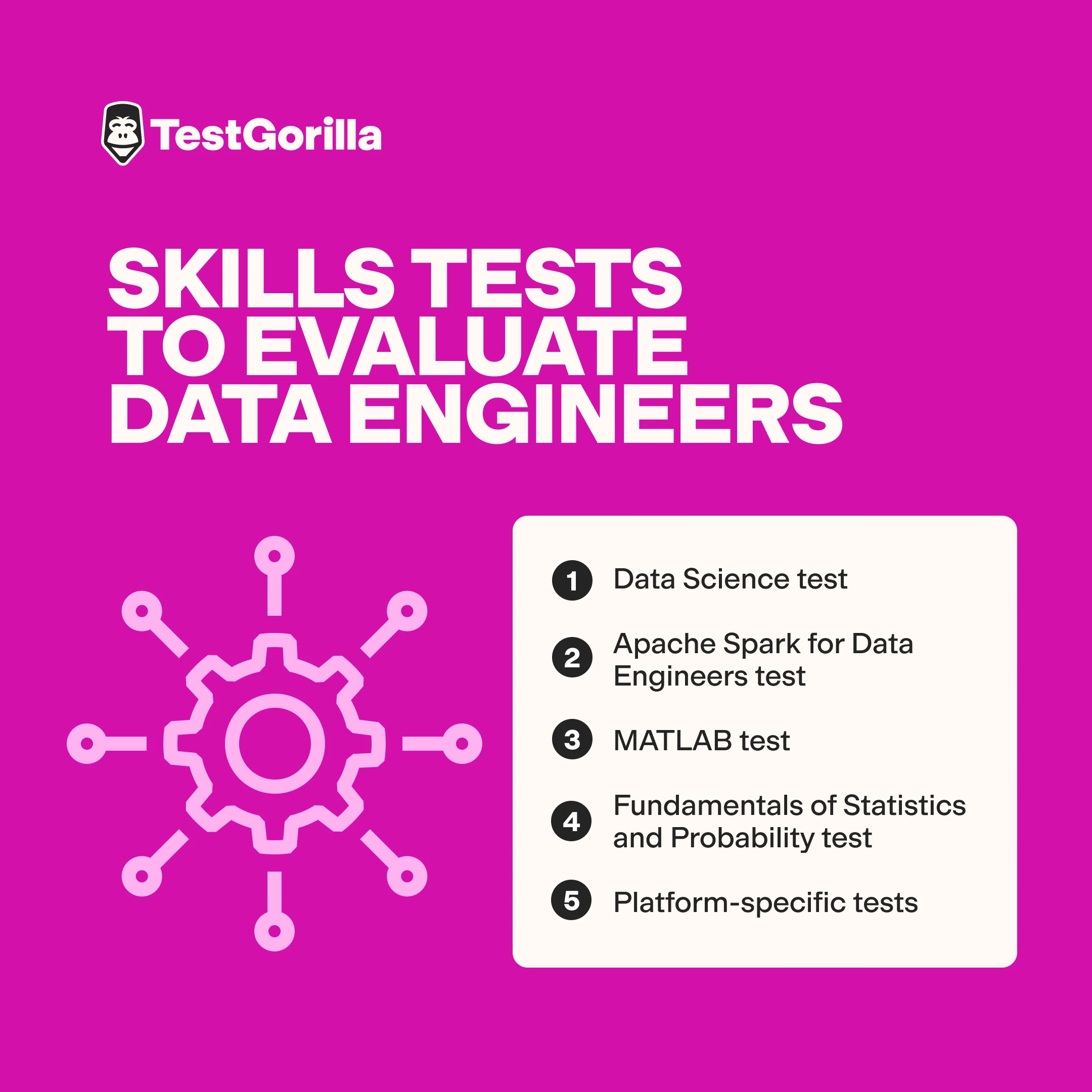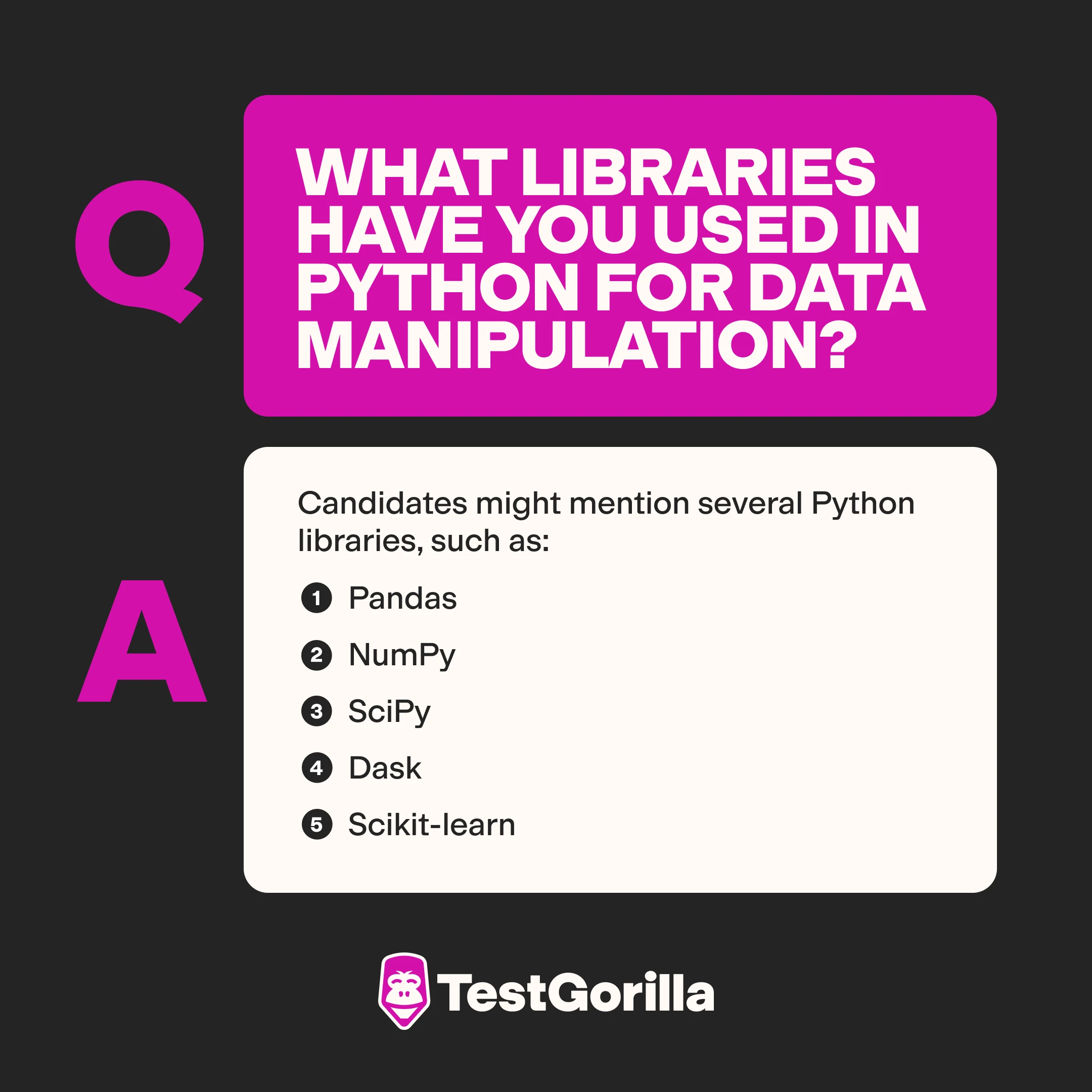For any organization that works with big data extensively, hiring skilled data engineers is a must. This means that you need to evaluate applicants’ abilities accurately and objectively during the recruitment process, without bias.
But how can you achieve that?
The best way to assess candidates’ skills is to use a pre-employment talent assessment featuring skills tests and the right data engineering interview questions.
Here are some skills tests you can use to evaluate your next data engineer’s skills and experience:
Data Science: Identify candidates who are proficient in statistics, deep learning, machine learning, and neural networks
Apache Spark for Data Engineers: Apache Spark is a key tool for data management; assess candidates’ experience with it with the help of this test
MATLAB: Evaluate applicants’ knowledge of this programming language with the help of our test
Fundamentals of Statistics and Probability: Make sure your next hire knows all the key notions of statistics and probability
Platform-specific tests, such as the Data Analytics in AWS, Data Analytics in GCP, and Data Analytics in Azure tests.
You can also add personality and culture tests to your assessment to get to know your candidates better.
Then, simply invite your most promising candidates to an interview. To help you prepare for this part of the hiring process, we’ve selected the best 55 data engineering interview questions below and provided sample answers to 22 of them.
Table of contents
Top 22 data engineering interview questions and answers to assess applicants’ data skills
Below, you’ll find our selection of the best interview questions to ask data engineers during interviews. We’ve also included sample answers to help you evaluate their responses, even if you have no engineering background.
1. What programming languages are you most comfortable with?
Most data engineers use Python and SQL because of their extensive support for data-oriented tasks.
Python’s libraries are particularly useful for data projects, so expect candidates to mention some of the following:
Pandas for data manipulation
PySpark for working with big data in a distributed environment
NumPy for numerical data
SQL is ideal for building database interactions, particularly in designing queries, managing data, and optimizing database operations.
Many data engineers also use Java or Scala when working with large-scale data processing frameworks such as Apache Hadoop and Spark.
To assess applicants’ proficiency in these languages and frameworks, you can use our Python (Data Structures and Objects), Pandas, NumPy, and Advanced Scala tests.
2. How do you approach issues with data accuracy and data quality in your projects?
Effective data management practices start with establishing strict data validation rules to check the data’s accuracy, consistency, and completeness. Here are some strategies candidates might mention:
Implement automated cleansing processes using scripts or software to correct errors
Perform regular data audits and reviews to maintain data integrity over time
Collaborate with data source providers to understand the origins of potential issues and improve collection methodologies
Design a robust data governance framework to maintain the high quality of data
3. What’s your experience with working in an Agile environment?
This question helps you evaluate candidates’ Agile skills and see whether they’re able to actively participate in all phases of the software development life cycle from the start.
Have they already taken part in projects in an Agile environment? Have they taken part in daily stand-ups, sprint planning, and retrospectives? Are they strong team players with excellent communication skills?
4. Explain the differences between SQL and NoSQL databases.
Expect candidates to outline the following differences:
SQL databases, or relational databases, are structured and require predefined schemas to store data. They are best used for complex queries and transactional systems where integrity and consistency are critical.
NoSQL databases are flexible in terms of schemas and data structures, making them suitable for storing unstructured and semi-structured data. They’re ideal for applications requiring rapid scaling or processing large volumes of data.
Check out our NoSQL Databases test for deeper insights into candidates’ experience with those.
5. How would you design a schema for a database?
Designing a database schema requires a clear understanding of the project’s requirements and how entities relate to one another.
First, data engineers need to create an Entity-Relationship Diagram (ERD) to map out entities, their attributes, and relationships. Then, they’d need to choose between a normalization and a denormalization approach, depending on query performance requirements and business needs.
In a normalized database design, data is organized into multiple related tables to minimize data redundancy and ensure its integrity
A denormalized design might be more useful in cases where read performance is more important than write efficiency
6. What tools have you used for data integration?
Data integration means combining data from different sources to provide a unified view. Tools that candidates might mention include:
For batch ETL processes: Talend, Apache NiFi
For real-time data streaming: Apache Kafka
For workflow orchestration: Apache Airflow
7. How do you ensure the scalability of a data pipeline?
Scalability in data pipelines is key for handling large volumes of data without compromising performance.
Here are some of the strategies experienced candidates should mention:
Using cloud services like AWS EMR or Google BigQuery, as they offer the ability to scale resources up or down based on demand.
Perform data partitioning and sharding to distribute the data across multiple nodes, reducing the load on any single node
Optimizing data processing scripts to run in parallel across multiple servers
Monitoring performance metrics with the help of monitoring tools and making adjustments to scaling strategies
8. What experience do you have with cloud services like AWS, Google Cloud, or Azure?
If you need to hire someone who can be productive as soon as possible, look for candidates who have experience with the cloud services you’re using. Some candidates might have experience with all three providers.
Look for specific mentions of the services candidates have used in the past, such as:
For AWS: EC2 for compute capacity, S3 for data storage, and RDS for managed database services
For Google Cloud Platform (GCP): BigQuery for big data analytics and Dataflow for stream processing tasks
For Microsoft Azure: Azure SQL Database for relational data management and Azure Databricks for big data analytics
To evaluate candidates’ skills with each platform, you can use our AWS, Google Cloud Platform and Microsoft Azure tests.
9. How would you handle data replication and backup?
Data replication and backup are critical for ensuring data durability and availability. Candidates might mention strategies like:
For data replication: Setting up real-time or scheduled replication processes to ensure data is consistently synchronized across multiple locations
For backup: Implementing regular automated backup procedures to ensure backups are securely stored in multiple locations (f.e. on-site and on the cloud)
10. What is a data lake? How is it different from a data warehouse?
A data lake is a storage repository that holds a large amount of raw data in its native format until needed. Unlike data warehouses, which store structured data in files or folders, data lakes are designed to handle high volumes of diverse data, from structured to unstructured.
Data lakes are ideal for storing data in various formats, because they provide flexibility in schema on read. This allows data to be manipulated into the required format only when necessary.
Data warehouses are highly structured and are most useful for complex queries and analysis where processing speed and data quality are critical.
11. How proficient are you in Hadoop? Describe a project where you used it.
Top candidates should be proficient in Apache Hadoop and would’ve used it extensively in the past. Look for specific examples, such as, for example, implementing a Hadoop-based big data analytics platform to process and analyze web logs and social media data to get marketing insights.
12. Have you used Apache Spark? What tasks did you perform with it?
Experienced data engineers would be proficient in Apache Spark, having used it for different data-processing and machine-learning projects. Tasks candidates might mention include:
Building and maintaining batch and stream data-processing pipelines
Implementing systems for real-time analytics for data ingestion, processing, and aggregation
If you need candidates with lots of experience with Spark, use our 45 Spark interview questions or our Spark test to make sure they have the skills you’re looking for.
13. Have you used Kafka in past projects? How?
This question helps you evaluate your candidates’ proficiency in Apache Kafka. Look for detailed descriptions of past projects where candidates have used the tool, for example to build a reliable real-time data ingestion and streaming system and decouple data production from consumption.
For deeper insights into candidates’ Kafka skills, use targeted Kafka interview questions.
14. What’s your experience with Apache Airflow?
Apache Airflow is ideal for managing complex data workflows and this question will help you evaluate candidates’ proficiency in it.
Look for examples of projects they’ve used this tool, for example to orchestrate a daily ETL pipeline, extract data from multiple databases, transform it for analytical purposes, and load it into a data warehouse. Ask follow-up questions to see what results candidates achieved with it.
15. What’s your approach to debugging a failing ETL (Extract, Transform, Load) job?
Debugging a failing ETL job typically involves several key steps:
Logging and monitoring to capture errors and system messages and identify the point of failure
Integrating validation checks at each stage of the ETL process to identify data discrepancies or anomalies
Testing the ETL process in increments to isolate the component that is failing
Perform environment consistency checks to ensure the ETL job is running in an environment consistent with those where it was tested and validated
16. What libraries have you used in Python for data manipulation?
Candidates might mention several Python libraries, such as:
Pandas, which provides data structures for manipulating numerical tables and time series
NumPy, which is useful for handling large, multi-dimensional arrays and matrices
SciPy, which is ideal for scientific and technical computing
Dask, which enables parallel computing to scale up to larger datasets
Scikit-learn, which is particularly useful for implementing deep-learning models
Use our Pandas, NumPy, and Scikit-learn tests to further assess candidates’ skills.
17. How would you set up a data-governance framework?
Here’s how a data engineer would set up a data governance framework:
Define policies and standards for data access, quality, and security
Assign roles and responsibilities to ensure accountability for the management of data
Implement data stewardship to maintain the quality and integrity of data
Use technology and tools that support the enforcement of governance policies
Ensure compliance with data protection regulations such as GDPR and implement robust security measures
Looking for candidates with strong knowledge of GDPR? Use our GDPR and Privacy test.
18. What are the differences between batch processing and stream processing?
Expect candidates to explain the following differences:
Batch processing involves processing data in large blocks at scheduled intervals. It is suitable for the manipulation of large volumes of data when real-time processing is not necessary.
Stream processing involves the continuous input, processing, and output of data. It allows for real-time data processing and is suitable for cases where immediate action is necessary, such as in financial transactions or live monitoring systems.
19. What methods do you use for data validation and cleansing?
Key methods to validate and cleanse data include:
Data profiling to identify inconsistencies, outliers, or anomalies in the data.
Rule-based validation to identify inaccuracies by applying business rules or known data constraints
Automated cleansing with the help of software to remove duplicates, correct errors, and fill missing values
Manual review when automated methods can't be applied effectively
20. What steps would you take to migrate an existing data system to the cloud?
Migrating an existing data system to the cloud involves:
Evaluating the current infrastructure and data and planning the migration process
Choosing the right cloud provider and services
Ensuring data is cleaned and ready for migration
Running a pilot migration test for a small portion of the data to identify potential issues
Moving data, applications, and services to the cloud
Post-migration testing and validation to ensure that the system operates correctly in the new environment
Optimizing resources and setting up ongoing monitoring to manage the cloud environment efficiently
21. What impact do you think AI will have on data engineering in the future?
AI can automate routine and repetitive tasks in data engineering, such as data cleansing, transformation, and integration, increasing efficiency and reducing the likelihood of human error, so it’s important to hire applicants who are familiar with AI and have used it in past projects.
It can also help implement more sophisticated data processing and data-management strategies and optimize data storage, retrieval, and use. The capacity of AI for predictive insights is another aspect experienced candidates will likely mention.
Use our Artificial Intelligence test or Working with Generative AI test to further assess applicants’ skills.
22. If you notice a sudden drop in data quality, how would you investigate the issue?
To identify the reasons for a sudden drop in data quality, a skilled data engineer would:
Check for any changes in data sources
Examine the data processing workflows for any recent changes or faults in the ETL (Extract, Transform, Load) processes
Review logs for errors or anomalies in data handling and processing
Speak with team members who might be aware of recent changes or issues affecting the data
Use monitoring tools to pinpoint the specific areas where data quality has dropped, assessing metrics like accuracy, completeness, and consistency
Perform tests to validate the potential solution and implement it
33 additional interview questions you can ask data engineers
If you need more ideas, we’ve prepared 33 extra questions you can ask applicants, ranging from easy to challenging. You can also use our Apache Spark and Apache Kafka interview questions to assess candidates’ experience with those two tools.
What are your top skills as a data engineer?
What databases have you worked with?
What is data modeling? Why is it important?
Can you explain the ETL (Extract, Transform, Load) process?
What is data warehousing? How is it implemented?
What’s your experience with stream processing?
Have you worked with any real-time data processing tools?
What BI tools have you used for data visualization?
Describe a use case for MongoDB.
How do you monitor and log data pipelines?
How would you write a Python script to process JSON data?
Can you explain map-reduce with a coding example?
Describe a situation where you optimized a piece of SQL code.
How would you handle missing or corrupt data in a dataset?
What is data partitioning and why is it useful?
Explain the concept of sharding in databases.
How do you handle version control for data models?
What is a lambda architecture, and how would you implement it?
How would you optimize a large-scale data warehouse?
How do you ensure data security and privacy?
What are the best practices for disaster recovery in data engineering?
How would you design a data pipeline for a new e-commerce platform?
Explain how you would build a recommendation system using machine-learning models.
How would you resolve performance bottlenecks in a data processing job?
Propose a solution for integrating heterogeneous data sources.
What are the implications of GDPR for data storage and processing?
How would you approach building a scalable logging system?
How would you test a new data pipeline before going live?
What considerations are there when handling time-series data?
Explain a method to reduce data latency in a network.
What strategies would you use for data deduplication?
Describe how you would implement data retention policies in a company.
If given a dataset, how would you visualize anomalies in the data?
Hire top data engineers with the right hiring process
If you’re looking to hire experienced data engineers, you need to evaluate their skills and knowledge objectively and without making them jump through countless hoops – or else you risk alienating your candidates and losing the best talent to your competitors.
To speed up hiring and make strong hiring decisions based on data (rather than on gut feelings), using a combination of skills tests and the right data engineering interview questions is the best way to go.
To start building your first talent assessment with TestGorilla, simply sign up for our Free forever plan – or book a free demo with one of our experts to see how to set up a skills-based hiring process, the easy way.
Related posts
Hire the best candidates with TestGorilla
Create pre-employment assessments in minutes to screen candidates, save time, and hire the best talent.
Latest posts
The best advice in pre-employment testing, in your inbox.
No spam. Unsubscribe at any time.

Hire the best. No bias. No stress.
Our screening tests identify the best candidates and make your hiring decisions faster, easier, and bias-free.
Free resources
This checklist covers key features you should look for when choosing a skills testing platform
This resource will help you develop an onboarding checklist for new hires.
How to assess your candidates' attention to detail.
Learn how to get human resources certified through HRCI or SHRM.
Learn how you can improve the level of talent at your company.
Learn how CapitalT reduced hiring bias with online skills assessments.
Learn how to make the resume process more efficient and more effective.
Improve your hiring strategy with these 7 critical recruitment metrics.
Learn how Sukhi decreased time spent reviewing resumes by 83%!
Hire more efficiently with these hacks that 99% of recruiters aren't using.
Make a business case for diversity and inclusion initiatives with this data.





















